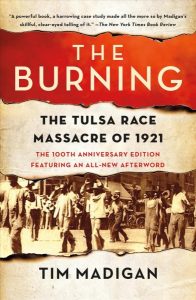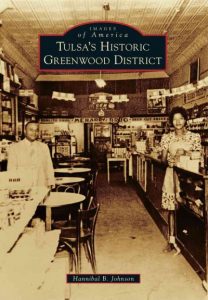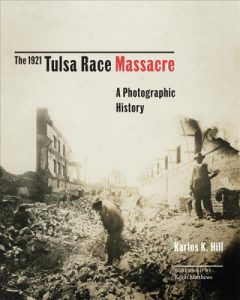From May 31 to June 1, 1921, a White mob numbering in the thousands – supported by private airplanes dropping incendiary bombs – obliterated the Greenwood District, a prosperous Black community in Tulsa, Oklahoma. Thirty-five city blocks were destroyed, while as many as 300 Black people were killed, and nearly 10,000 were left homeless.
Book List
Below is a curated and annotated list of books on this topic held at the Springfield City Library as of May 2021, with links to our catalog. Those books available as electronic items (eBooks and eAudiobooks) in Hoopla and Overdrive have links as well.
You can request these books directly in the catalog, or contact any library location for assistance.
Other Resources (click to go directly to the list)
A list of resources available online to learn more about the Tulsa Race Massacre, including an online panel being held June 1.
Book List
 The Burning: The Tulsa Race Massacre of 1921 by Tim Madigan (2001, with a 2021 afterword)
The Burning: The Tulsa Race Massacre of 1921 by Tim Madigan (2001, with a 2021 afterword)
Details how from May 31st – June 1st, 1921, a White mob numbering in the thousands marched across the railroad tracks dividing Black from White in Tulsa, Oklahoma, and obliterated the Greenwood District, a Black community then celebrated as one of America’s most prosperous. As many as 300 people were killed, and nearly 10,000 were left homeless.
Black Wall Street: From Riot to Renaissance in Tulsa’s Historic Greenwood District by Hannibal B. Johnson (1998)
In the costliest racial attack in American history, Tulsa’s famed Greenwood District was burned to the ground. Lifelong Tulsa resident Hannibal B. Johnson details the rise and destruction of the Greenwood district and its eventual rebirth. In July 2021, look for Johnson’s Black Wall Street 100: An American City Grapples with Its Historical Racial Trauma.
 Tulsa’s Historic Greenwood District by Hannibal B. Johnson (2014)
Tulsa’s Historic Greenwood District by Hannibal B. Johnson (2014)
This pictorial history in the “Images of America” series displays photographs of the Greenwood District before, during, and after the Tulsa Race Massacre. The author provides a brief history of the district and ends his narrative with quotes from interviews with survivors of the massacre.
Black Fortunes: The Story of the First Six African Americans Who Survived Slavery and Became Millionaires by Shomari Wills (2018)
The untold history of America’s first Black self-made entrepreneurs—former enslaved people who endured incredible challenges to amass and maintain their wealth—including O. W. Gurley, an educator and landowner who in 1905 purchased 40 acres in Tulsa, Oklahoma, and developed them into the thriving Greenwood District.
 The 1921 Tulsa Race Massacre: A Photographic History by Karlos K. Hill (2021)
The 1921 Tulsa Race Massacre: A Photographic History by Karlos K. Hill (2021)
Oral testimonies and more than 175 photographs shine a spotlight on the race massacre from the vantage point of its victims and survivors. Historian Karlos K. Hill describes how White civilians, in many cases assisted or condoned by local and state law enforcement, perpetuated a systematic, coordinated attack on Black Tulsans and their property.
The Nation Must Awake: Our Witness to the Tulsa Race Massacre of 1921 by Mary E. Jones Parrish (2021)
A journalist and teacher’s first-person account, along with the recollections of dozens of others, compiled immediately after the race massacre. Published widely for the first time, these testimonies underscore Black residents’ bravery and the horror of seeing their neighbors gunned down and their community lost to flames.
Reconstructing the Dreamland: The Tulsa Race Riot of 1921, Race Reparations, and Reconciliation by Alfred L. Brophy (2002)
Taking his title from the popular Black-owned Dreamland Theatre torched by White arsonists in 1921, legal scholar Alfred L. Brophy discusses the dreams, businesses, and lives destroyed by the Tulsa Race Massacre and argues for the need for reparations for its survivors.
The Ground Breaking: An American City and Its Search for Justice by Scott Ellsworth (2021)
Unearths the lost history of how the Tulsa Race Massacre was covered up and of the courageous individuals who fought to keep the story alive. The author recounts the ongoing search for the unmarked graves of the victims of the massacre and of the fight to win restitution for the survivors and their families.
Tulsa 1921: Reporting a Massacre by Randy Krehbiel (2021)
Krehbiel, a reporter for the Tulsa World newspaper since 1979, digs deep into the circumstances and attitudes that gave rise to the Tulsa Race Massacre and considers how the Tulsa World, the Tulsa Tribune, and other publications contributed to White Tulsans creating a justification for the massacre.
A Massacre in Memphis: The Race Riot that Shook the Nation One Year After the Civil War by Stephen V. Ash (2013)
The Tulsa Race Massacre was not the first large-scale racially motivated attack in the United States. In May 1866, Memphis erupted in a three-day spasm of racial violence that saw Whites murdering 46 freed Black people and burning Black-owned businesses, homes, and churches.
Wilmington’s Lie: The Murderous Coup of 1898 and the Rise of White Supremacy by David Zucchino (2020)
By the 1890s, Wilmington, North Carolina, was a shining example of a mixed-race community, but in 1898, armed White supremacists overthrew Wilmington’s multi-racial government and killed dozens of Black people in the streets, forcing hundreds of Black citizens to flee for their lives.
Red Summer: The Summer of 1919 and the Awakening of Black America by Cameron McWhirter (2011)
For eight months in 1919, an unprecedented wave of anti-Black lynchings and massacres swept the country. Millions of lives were disrupted, and hundreds of lives were lost, but Blacks, led by returning Black veterans of World War I, fought back with intensity and determination.
The Rosewood Massacre: An Archaeology and History of Intersectional Violence by Edward González-Tennant (2018)
Investigates the 1923 race massacre that devastated the predominantly Black community of Rosewood, Florida. The town was burned to the ground by neighboring Whites, and its residents escaped with their lives, never to return. Drawing on new methods and theories, Edward González-Tennant uncovers important elements of the forgotten history of Rosewood.
Other Resources
The 1921 Tulsa Race Massacre Centennial Commission was formed to educate people about the massacre, remember its victims and survivors, and foster entrepreneurship and heritage tourism in the area of the Greenwood District. The Commission has organized a series of events this spring, including a nationally televised Remember + Rise commemoration on May 31st and the dedication on June 2nd of Greenwood Rising: The Black Wall Street History Center.
The Tulsa Historical Society and Museum has created an online exhibit about the 1921 Tulsa Race Massacre which contains photographs, audio recordings from survivors and contemporaries, documents such as court cases, and an historical overview of the massacre.
The National Museum of African American History & Culture and Smithsonian Magazine will be hosting an online panel discussion, “Historically Speaking: 100th Anniversary and Remembrance of the Tulsa Race Massacre” on Wednesday, June 2nd, from 7-8:30 pm. Registration for this free event is recommended.
In 2015, a long lost 10-page, typed eyewitness account of the race massacre by Black Tulsan lawyer B.C. Franklin was rediscovered. In “The Tulsa Race Riot and Three of Its Victims,” Franklin describes how private planes dropped incendiary bombs on the Greenwood District while White attackers gunned down Black residents in the streets. Images of this manuscript’s pages can be viewed online at the Smithsonian’s National Museum of African American History & Culture.
On May 19, 2021, three living survivors of the Tulsa Race Massacre testified for 2.5 hours in a hearing before the U.S. House of Representatives. This National Public Radio article describes their powerful eyewitness accounts and includes a three-minute audio recording of their testimony and their calls for justice.
